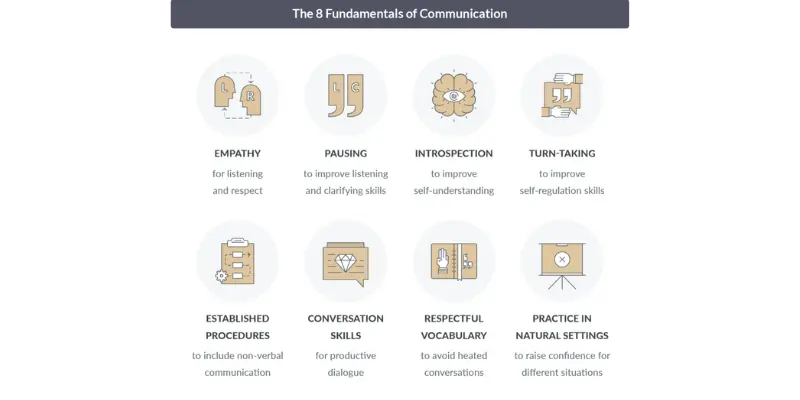Communication skills are often cited as a critical element in all relationships. Lack of communication skills is often cited for failure of personal and professional relationships. But what are communication skills? People define communication skills differently. However, good communication skills are essential in relating to others. One’s people skills are largely composed of communication skills. The importance of communication skills is connected to one’s interpersonal skills. These interpersonal skills include listening and speaking effectively. Being encouraging, empathetic, and motivating are part of what is communication. This is especially true of what is effective communication. Communication skills in both personal and professional life are important
Communication Styles
There are different styles of verbal communication. One communication style is assertive communication. This communication style involves listening to other’s needs but also stating one’s own. Assertive communication is preferable. Assertive communication avoids various communication barriers. One communication barrier is a lack of understanding. Directly stating what you want leads to fewer communication barriers.
There are also written communication styles, both formal and informal. With family and friends, informal written communication with slang, idioms, and nonstandard grammar is acceptable. Effective communication in the workplace involves a more professional communication style. A professional communication style has no slang terms or idioms that cause a communication barrier. Also important in workplace communication is the avoidance of sentence fragments. Complete, grammatically correct sentences are preferred. Communicating effectively in the workplace. Therefore needs careful editing and proofreading of written work. Communication in the workplace involves a number of other skills.
List of Eight Communication Skills Your Boss Expects You to Know:


Effective communication skills, in general, can be divided into listening skills, speaking skills, and written communication skills. Communication skills are important in many areas of life. These areas are with one’s family, friends, and neighbors. In addition, there are eight skills related to effective workplace or business communication skills.
List of Communication Skills for Workplace Communication
1. Interpersonal Communication Skills: Good interpersonal communication involves communicating effectively with others. These other people include supervisors, peers, and subordinates. Good interpersonal communication is direct, clear, and respectful. “Interpersonal skills” involve communicating one-on-one with another person. It usually does not mean communicating in a group, which is a different skill.
2. Listening Skills. Effective listening skills is critical for communication skills in general. It is also the most important skill for communication in the workplace. Effectively listening to others is crucial for showing respect. In the workplace, listening is also critical for understanding directions. Listening effectively involves paying complete attention to the other person. This involves clearing your mind of other thoughts, including focusing on what you will say next.
3. Speaking Skills. Oral communication and speaking skills in the workplace should be direct, clear, and respectful. Ask for other’s opinions and state your own. Recognize other perspectives even if you don’t agree. Oral directions should be precise, slow, and broken into steps. Avoid slang, jargon, and idioms others may not understand. Maintain eye contact when speaking to others.
4. Presentation Skills. Presentation skills are a major part of speaking skills in the workplace. Presentation skills relate to speaking in front of a group of people. The group may be large or small. Whatever the size, effective presentation skills involve a number of components. The first element is speaking with enough volume to be heard. Slowing down enough to speak clearly is also important. Also involved are staying focused on a topic and providing visuals. Finally, effective presentation skills mean being enthusiastic about the topic and audience.
5. Negotiation Skills. Negotiation skills are another big part of effective speaking skills in the workplace. Negotiation skills build on the effective listening and speaking skills discussed. Also involved in negotiation skills is the ability to stay focused on one’s own goal in the negotiations. However, the other side’s goal must also be recognized. Finally, the ability to compromise is important to negotiation skills. In compromise, each side giving away part of his or her goal to the other side. This is done for the greater good of peace and understanding between the two parties. In a typical workplace conflict, a disagreement might occur over how much of the budget should be allocated to different projects. Each side makes a case for how much money is needed for its own project. Listening to the other party’s case is critical. Finally, a compromise might be reached with each side agreeing to cut costs. They can then divide up the budget according to each side’s needs.
6. Written Communication Skills. Also important to communication skills is written communication. Frequently, one must communicate with supervisors, peers, subordinates, and individuals outside the workplace community in writing. As with oral communication, written communication should be direct and clear. It should also be free of slang and professional “jargon.” Jargon is a specialized term used in any workplace setting. These terms are often not used anywhere else. For example, a college staff member will know “LRC” means “learning resource center,” or library. However, few people outside the profession will know that.
7. Teamwork Skills. Another part of effective communication skills is teamwork skills. Teamwork skills involve not just communicating effectively with a whole team. Effective teamwork skills include speaking effectively in groups. Generating enthusiasm for the team goal or goals is another big part of teamwork skills. Teamwork skills also include the ability to delegate tasks and assign roles. Finally, teamwork skills involve recognizing both group and individual needs within the group.
8. Leadership Communication. Leadership skills are a complex web of other communication
skills. Leadership skills involve not only communicating well with individuals and groups. Leadership skills also include supervisory skills. Supervisory skills involve the ability to lead individuals and groups toward a goal. Leadership skills involve monitoring individual and group performance. Also involved are modeling effective performance and providing positive and corrective feedback. Finally, management skills are the highest form of leadership skills. Management skills involve a number of subskills. These are teamwork, effective group and individual communication, and supervisory skills. Also added is managing and entire group and project from beginning to end.
How to Improve Communication Skills?
Given the importance of communication skills, many people want to improve them. Many people are concerned about how to communicate with others and how to communicate effectively. There are some communication barriers to effective communication skills. Some barriers to communication include general shyness, fear of speaking out, language difficulties, or poor writing skills. There are different communication methods in learning how to communicate better and improve communication skills. There are also many communication skills training classes and workshops. These might be found online or through your workplace’s human resources department. Many are free or inexpensive.
Some communication techniques and communication exercises one might learn in communication skills training follow:
1. Communication Training. This involves training in the general communication skills discussed of listening and speaking effectively. Communicating assertively and directly is often emphasized. Active listening is also a critical component of communication skills. This involves not only listening but giving feedback to the speaker. This feedback involves verbal and body language that you are listening. Questions to make sure you understand the other party is also a part of communication training.
2. Presentation Skills Training. Presentation skills training is learning to speak in front of groups. A number of subskills are involved in presentation skills training. Learning these subskills including relaxation techniques, planning and organization of the presentation, and use of visuals. Also included will be eye contact and use of body language.
Some other communication skills activities and communication exercises for the workplace are below.
1. Training in Listening. Listening training includes listening for increasing intervals of time and not interrupting. It also includes effective eye contact and focus. Providing feedback to the speaker to show you are listening is also part of training in listening skills.
2. Make One Request a Day of Another Person. Practice assertive communication skills. This doesn’t mean aggression and rudeness. But don’t try to do everything yourself. Sometimes ask a colleague to write the memo or speak to the difficult customer.
3. Speaking up in Meetings. Speaking up in meetings can be critical to workplace success. Share your ideas and take credit for them. Practice speaking up at least once per meeting.
4. Knowing How to Build a Conversation or Discussion. Beyond effectively listening, building a conversation is also an important communication skill. Building a discussion involves asking questions and listening actively. Also included are asking for further information, giving examples, and asking for other ideas. Don’t let conversations die after one or two comments.
5. Getting Quieter People to Talk. Often shyer people are very reflective. Basic workplace communication skills include asking the opinion of quieter people. Don’t just listen to the more outgoing staff members. Include the quieter people.
Communication skills are critical to success. The skills are complex and multi-faceted. They involve interpersonal skills, effective listening skills, speaking skills, and teamwork skills. However, communication skills are not difficult to learn with practice.


